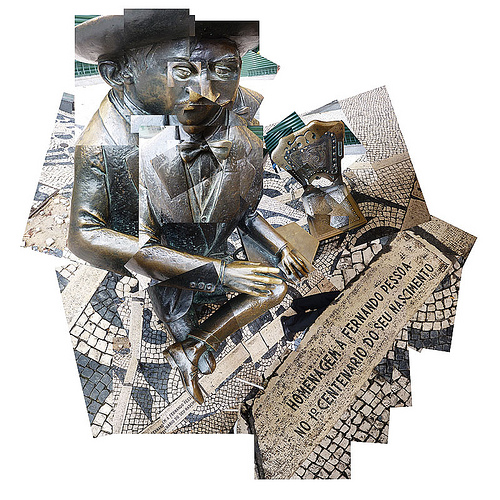Saudade, Hiraeth, and Hüzün
by Israel Centeno and translated by Kelly Harrison / December 5, 2013 / No comments
The beautiful, pointless efforts to describe “This bluish forlorn indefiniteness of everything!”

Collage of the stature of Fernando Pessoa in Lisbon, Portugal. Photo: Mário Pires via Flickr.
In a letter to Armando Côrtes-Rodrigues in 1914, the Portuguese poet Fernando Pessoa wrote, “For months, I have been experiencing a feeling of profound incompatibility with the creatures around me.” He went on to describe it as “the state of non-being.”

- From his lonely watch post Albert Camus asked who among us has not experienced exile yet still managed to preserve a spark of fire in their soul. “We’re all alone,” Natalia Sedova cried in exile on hearing of her husband Leon Trotsky’s affair with Frida Kahlo. In his novel Night Watch, Stephen Koch follows the incestuous love affair of David and Harriet, wealthy siblings watching the world from their solitary exile. Koch’s writing, Camus’s theories, and Trotsky’s affair all come back to exile and lead me to reflect on the human condition. From my own vantage point, my Night Watch, I will reflect on my questions of exile, writing, and the human condition.

- Israel Centeno was born in 1958 in Caracas, Venezuela, and currently lives in Pittsburgh as a Writer-in-Residence with City of Asylum/Pittsburgh. He writes both novels and short stories, and also works as an editor and professor of literature. He has published nine books in Venezuela and three in Spain.
My search to ascribe a tangible meaning to the oblique feeling that goes above and beyond simple nostalgia led me to this Portuguese writer, and prompted me to read his works, switching between his various heteronyms. In the instance below, for example, Pessoa writes as Álvaro de Campos:
“I have come here not to wait for anyone,
to watch the others wait,
to be all the others waiting,
to be the hope of all the others.”
I could immerse myself in the poet’s universe, but I want to add an element to the mix: The pure state of bewilderment and acerbity encompassed by the terms saudade, hiraeth, and hüzün.
In this I refer to Plegarias para un zorro (Prayers for a Fox), a collection of short stories by Enza García Arreaza. In this volume, the feeling of “non-being,” of not belonging, and the pain felt for something that never was, or something that is actually an impossible dream, sets the reader on edge.
Whoever has the fortune of reading “Akuma contra el tiempo” (Akuma Versus Time), one of the stories in Prayers for a Fox, will be sharply immersed in the cosmogony of a non-existent place. In that story García Arreaza writes: “We came from a time when we would move between the shade of the trees and the stars that still do not shine; we sang, we were ruled by the naïve emperor of the ages, then we died and the country grew.”
In regard to Prayers for a Fox, Miguel Gomes has said, “This is a book about distance.”
I would like to think that it’s also a book about the impossibility of return. Bridges are burned by each of the voices in the book; a painful journey, the lament sung by Dido, Queen of Carthage, following Aeneas’ departure.
All of which brings me back to the beginning of my ruminations: The pointless exercise of trying to explain feelings.
Using the terms hüzün, saudade, or hiraeth involves reading García Arreaza out loud: “I would have liked to have told him that his grandfather saw mermaids in the north, despite the snow. I used to enjoy sitting beside the sea and talking about the snow. To tell him that there was nothing wrong with knowing that eternity was elsewhere…” Or Pessoa, when he exclaims in The Book of Disquiet (El libro de desasosiego): “Ah, another world, other things, another soul with which to feel them, another mind with which to know this soul! Anything, even tedium—anything but this general blurring of the soul and things, this bluish, forlorn indefiniteness of everything!”
Saudade.




